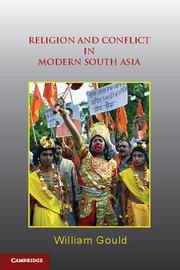Book contents
- Frontmatter
- Contents
- Abbreviations
- Glossary
- Acknowledgements
- 1 Introduction
- 2 Building Spheres of Community
- 3 Transforming Spheres of Community
- 4 Defining Spheres of Community
- 5 State Transformation, Democracy and Conflict
- 6 Forging National Consensus and Containing Pluralism
- 7 New Conflicts and Old Rivalries
- 8 The Resurgence of Communalism?
- Conclusion
- Bibliography
- Index
Conclusion
Published online by Cambridge University Press: 05 June 2012
- Frontmatter
- Contents
- Abbreviations
- Glossary
- Acknowledgements
- 1 Introduction
- 2 Building Spheres of Community
- 3 Transforming Spheres of Community
- 4 Defining Spheres of Community
- 5 State Transformation, Democracy and Conflict
- 6 Forging National Consensus and Containing Pluralism
- 7 New Conflicts and Old Rivalries
- 8 The Resurgence of Communalism?
- Conclusion
- Bibliography
- Index
Summary
Anyone glancing at a library catalogue or bookshelf on the politics or history of India, Pakistan, Bangladesh and Sri Lanka may be forgiven for thinking that religious cultures have defined some of the most important political developments in the region over the twentieth century. This is partly the result of the dominance of long-standing Western academic frameworks. A key aspect of British colonial knowledge was that religious traditions largely defined distinctively ‘Indian’ political and social organisations – an idea that also served to justify British power for most of the late colonial period. Although this book has focussed on religion and conflict, it has attempted to oppose suggestions that South Asian societies should be defined principally in relation to religious cultures. Throughout, it has also argued for a clear distinction between structures of religious belief and practice and the phenomenon of religious community mobilisation. The latter has taken place for largely political ends, often for purely secular purposes. And it is the latter that has formed the main focus of this book, since such movements have been implicated in moments of dramatic confrontation between different organisations and communities. The book has also attempted to show that violence and conflict were not the only or even the principal manifestations of ‘communal’ mobilisation. Even where the casualties of violence inspired by religious or ethnic difference have been extensive, such as Sri Lanka since 1983, the psychological motivations for violence and its extreme implications for local societies have often clouded deeper-seated political differences. This is not to suggest that violence itself is not significant to our analysis, but that its manifestation does not epitomise or necessarily explain religious and communal conflict. This is not least because it has been the practice of political parties and of states to use and recreate information about extreme violence as a means of furthering broader political agendas. ‘Violence’ has become a loaded term, an ontological category if you will, as much as ‘communalism’ in South Asia.
- Type
- Chapter
- Information
- Religion and Conflict in Modern South Asia , pp. 309 - 316Publisher: Cambridge University PressPrint publication year: 2011



